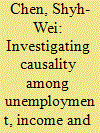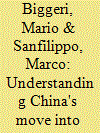| Srl | Item |
| 1 |
ID:
086215


|
|
|
|
|
| Publication |
2009.
|
| Summary/Abstract |
This paper examines the long-run and causal relationships among unemployment, income and crime in Taiwan. The results clearly indicate that there is a long-run level equilibrium relationship among unemployment, income and total crime. There are also long-run relationships among unemployment, income and theft and among unemployment, income and economic fraud. The causality test results from the ECM-VAR and level VAR models indicate that there is a neutral relationship among unemployment, income and total crime, and a neutral relationship among unemployment, income and all three categories of crime. It is concluded that there is no strong evidence in favor of the unemployment-led crime (ULC) or the crime-led unemployment (CLU) hypotheses in Taiwan.
|
|
|
|
|
|
|
|
|
|
|
|
|
|
|
|
| 2 |
ID:
086203


|
|
|
|
|
| Publication |
2009.
|
| Summary/Abstract |
This paper aims at estimating the Environmental Kuznets Curve (EKC) for the sulphur dioxide (SO2) emissions in a panel of 28 Chinese provinces. First, using a fixed effects model, econometric findings reveal an N shape EKC with a turning point of 4500 yuans (index 1990). However, a Chow test reveals a break in 1995, so that the estimation of the model indicates an increasing linear relationship between GDP per capita and SO2 emissions. The previous results imply that the decrease of the Chinese sulphur dioxide emissions during 1996-1999 did not result from the ECK but from an exogenous public action.
|
|
|
|
|
|
|
|
|
|
|
|
|
|
|
|
| 3 |
ID:
086206


|
|
|
|
|
| Publication |
2009.
|
| Summary/Abstract |
An important new issue on the international scene is the upsurge in market and non-market South-South relations. The aim of this paper is to understand the dynamics that lie behind the recent Chinese move into Africa by empirically exploring the determinants of Sino-African relationships. In order to have a comprehensive picture, the analysis takes into consideration the main channels of commercial and political interactions: outward foreign direct investment (OFDI), trade and aid (international economic cooperation). The empirical analysis utilises a panel data set, from 1998 to 2005, for 43 African countries. The econometric estimates for three simultaneous equations are based on an instrumental variables method. Results show that the Chinese move into Africa is driven by strategic interaction among the three channels (FDI, trade and economic cooperation) as well as by pull factors, i.e. the characteristics of the receiving countries in terms of natural resource endowments and their market potential.
|
|
|
|
|
|
|
|
|
|
|
|
|
|
|
|
| 4 |
ID:
086205


|
|
|
|
|
| Publication |
2009.
|
| Summary/Abstract |
Trade has been shown by many authors to have strong positive impact on productivity. However, we also see some others being more reserved about such an impact. This study intends to investigate whether trade is enough for better economic performance, or rather, whether the impact of trade depends on the quality of local institutions. Using a panel of China's provincial data, empirical estimation results show that the better the quality of local institutions, the stronger the positive impact of trade on total factor productivity. If local institutions did not reach a certain quality level, trade expansion could have a negative marginal effect on total factor productivity.
|
|
|
|
|
|
|
|
|
|
|
|
|
|
|
|